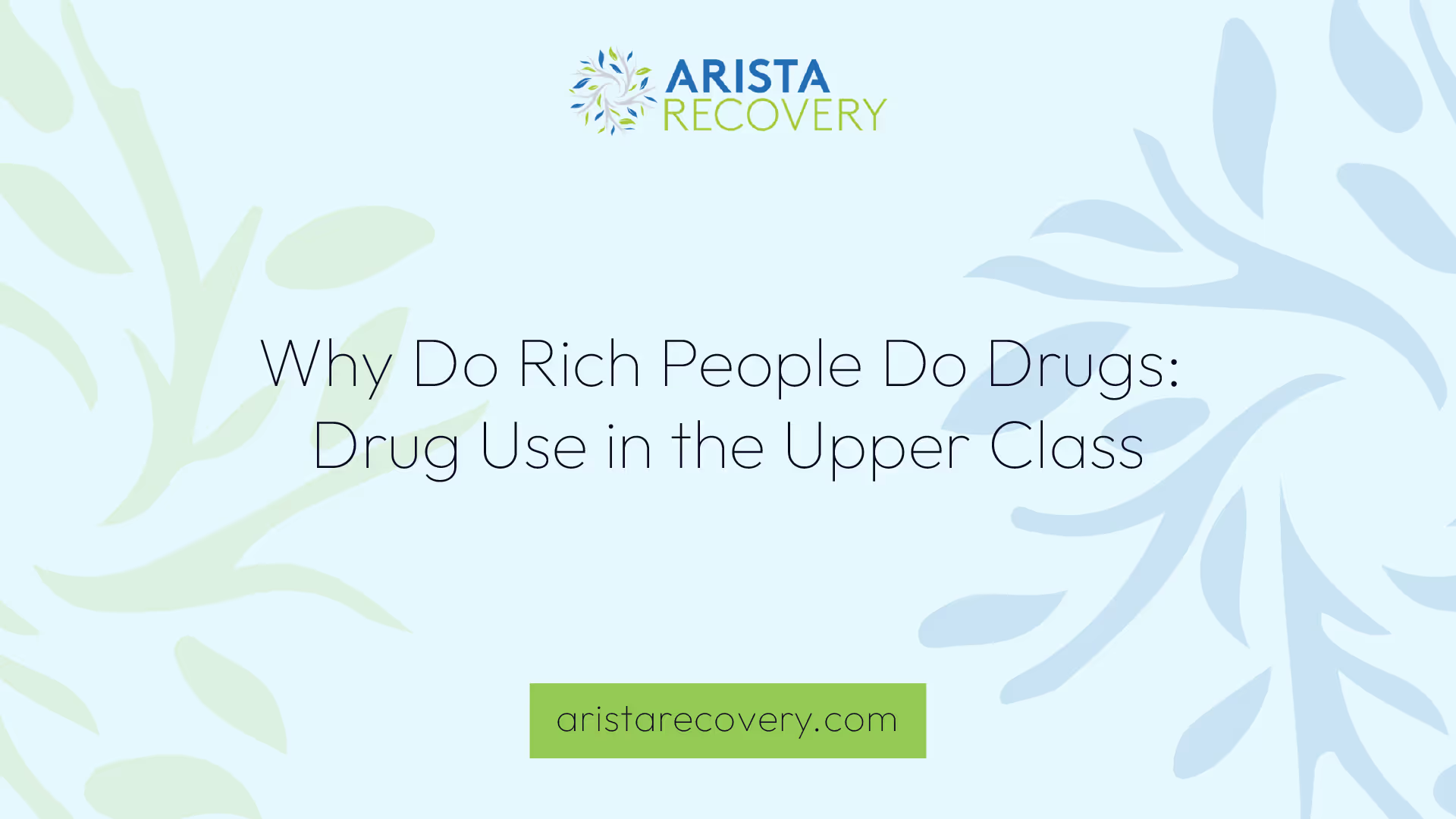Why Do Rich People Do Drugs: Drug Use in the Upper Class

The Paradox: Wealth and Substance Abuse
Often, the connection between wealth and substance abuse is overlooked due to the misconceptions surrounding affluence. Contrary to popular belief, the rich and successful are not immune to addiction. In fact, the correlation between wealth and drug use presents a paradox that explores why rich people do drugs.

Wealth and Addiction Rates
While wealth can provide many benefits, it also comes with its own set of challenges, one of which is an increased susceptibility to substance abuse. Wealthy individuals are greatly impacted by alcohol and drug addiction, a problem that can be attributed to factors such as access to disposable income and a culture of excess and indulgence. The affluent lifestyle can facilitate access to drugs and may contribute to a higher prevalence of recreational drug use [1].
Studies have shown that the children of wealthy individuals experience higher rates of substance abuse compared to national rates. This suggests that the environment and lifestyle associated with wealth can significantly influence drug use habits.
Mental Health Issues Among the Wealthy
The connection between wealth and mental health is another important factor to consider when investigating why rich people do drugs. Wealthy individuals have experienced greater levels of anxiety and depression during the COVID-19 pandemic despite massive increases in wealth among ultra-high-net-worth and high-net-worth individuals. These mental health issues can, in turn, exacerbate substance abuse problems as individuals turn to drugs as a means of coping.
Moreover, the pressures and stresses that come with wealth and success can contribute to the allure of drugs. Some affluent individuals may turn to drugs as a means of escapism and stress relief from the demands and expectations of their high-profile lifestyles [1].
In conclusion, wealth can exacerbate the risks of substance abuse and mental health issues. Therefore, it is essential to address these issues in the context of wealth to develop effective prevention and treatment strategies.
The Role of Lifestyle and Environment
Understanding why affluent individuals may be more inclined towards drug use requires an investigation into their lifestyle and environment. The socioeconomic factors that surround them and the influence of their peer circles play significant roles.
The Socioeconomic Factors
The wealthy often face extreme stress due to career and financial obligations, making it challenging to allocate time for self-care and activities that improve mental wellness. This lack of balance can lead to negative coping mechanisms, such as substance use.
Furthermore, the association between wealth and drug use can be linked to the access to disposable income and a culture of excess and indulgence. The affluent lifestyle can facilitate easier access to drugs and may contribute to a higher prevalence of recreational drug use [1].
Factors such as boredom and excess free time can also influence drug use among the wealthy. With limited responsibilities and a desire for excitement, some affluent individuals may turn to drugs as a form of entertainment or stimulation to fill the void and inject excitement into their lives.
Additionally, factors such as accessibility and affordability contribute to the allure of drugs for some affluent individuals. Having substantial financial resources makes drugs more accessible, allowing the wealthy to purchase drugs of their choice, often in larger quantities and from exclusive sources. The ability to consume drugs discreetly within private environments is also appealing to some.
Influence of Peer Circles
Social influences also play a significant role in drug use among the rich. Peer pressure and the influence of social circles can have a notable impact. Affluent individuals may find themselves surrounded by peers who engage in drug use, whether as a means of bonding, networking, or as a shared interest. The influence of social circles can normalize drug use and make it more acceptable within these exclusive groups [1].
By understanding the lifestyle and environmental factors that contribute to substance use among the wealthy, we can begin to address the question of 'why do rich people do drugs?' more comprehensively. It's a complex issue that involves a mix of socioeconomic factors, personal stressors, and social influences.
The Motivations Behind Substance Use
In an attempt to answer the question 'why do rich people do drugs?', it's essential to delve into the motivations behind substance use in the upper class. From high-pressure environments to using drugs as a coping mechanism, the reasons are multifaceted and complex.
Dealing with High-Pressure Environments
Wealthy individuals often face extreme stress from their career and financial obligations, which can contribute to the attraction of drugs [2]. The pressure and stress that come with wealth and success can make drugs seem like an appealing avenue for escapism and stress relief from the demands and expectations of their high-profile lifestyles.
In addition, boredom and excess free time can also be factors that influence drug use among the wealthy. With limited responsibilities and a desire for excitement, some affluent individuals may use drugs as a form of entertainment or stimulation [1].
Substance Use as a Coping Mechanism
When dealing with high-pressure environments, substance use may be perceived as a coping mechanism. The influence of social circles can also play a significant role in this scenario. Affluent individuals may find themselves surrounded by peers who engage in drug use, which can normalize the behavior and make it seem more acceptable within these exclusive groups.
Furthermore, factors such as accessibility and affordability contribute to the allure of drugs for some affluent individuals. With substantial financial resources, drugs become more accessible, allowing the wealthy to purchase drugs of their choice, often in larger quantities and from exclusive sources. The ability to consume drugs discreetly within private environments is also appealing to some.
In conclusion, the motivations behind substance use in the upper class are complex and multifaceted, and can be influenced by a range of factors including stress, peer pressure, accessibility, and the desire for escape or excitement. As society continues to grapple with the issue of substance abuse, understanding these motivations is crucial in creating effective prevention and treatment strategies.
Consequences and Implications of Substance Use
The consequences and implications of substance use among the wealthy can differ from what is generally observed in lower socioeconomic classes. The influence of wealth can act as a protective shield, mitigating some of the potential repercussions. However, the impact on personal and social relationships can be significant.
The Protective Shield of Wealth
Wealthy individuals are often better protected from the usual consequences associated with substance abuse such as financial and legal issues, or career problems. The association between wealth and drug use can be attributed to factors such as access to disposable income and a culture of excess and indulgence. The affluent lifestyle can facilitate access to drugs and may contribute to a higher prevalence of recreational drug use.
The perception of invincibility due to financial privilege and access to resources can also contribute to the development of drug abuse issues among wealthy individuals. This protective shield of wealth can lead to a false sense of security, potentially exacerbating the substance abuse problem and making it more difficult to address.
Impact on Personal and Social Relationships
While wealth can shield individuals from some of the external consequences of drug use, it cannot protect them from the impact on personal and social relationships. Wealthy individuals may turn to substance abuse as a way to cope with stress, isolation, or the pressure to perform at high levels in their professional lives. This can lead to a cycle of addiction that is difficult to break.
The luxurious and extravagant lifestyle that many affluent individuals lead can also expose them to environments and social circles where drug use is normalized, increasing the risk of substance abuse. This normalization can further strain relationships with family and friends, especially if these connections do not share or support the individual's substance use.
The impact of substance abuse on personal and social relationships can be profound, leading to isolation, damaged relationships, and a loss of trust. The complexities of wealth and substance abuse highlight the need for tailored approaches to addiction treatment that address the unique challenges and considerations of this demographic.
Addiction Treatment Considerations for the Wealthy
When addressing the question of 'why do rich people do drugs?', it's important to also consider the specific challenges and considerations when it comes to addiction treatment for the wealthy.
Overcoming the Stigma
Wealthy individuals often face stigma and judgment when seeking addiction treatment due to societal perceptions of wealth and privilege [2]. This stigma can be a significant barrier to seeking help, as it may create feelings of guilt, shame, and isolation. Providing a supportive and non-judgmental environment is essential in addiction treatment for the wealthy, as they may face unique challenges and pressures that require understanding and empathy from treatment providers.
Tailored Approaches for Addiction Treatment
Addiction treatment programs for the wealthy often need to address unique challenges such as maintaining privacy and confidentiality, accommodating demanding schedules, and providing luxurious amenities to meet their expectations [2]. Tailored approaches for addiction treatment among the wealthy may involve a combination of evidence-based therapies, holistic treatments, and specialized programs that address the specific needs and preferences of affluent individuals.
Personalized treatment options may include one-on-one therapy, executive rehab programs, and concierge services. Luxury rehab centers may offer amenities such as private rooms, gourmet meals, spa services, and recreational activities to cater to the preferences and lifestyle of affluent individuals seeking addiction treatment.
The integration of alternative therapies such as yoga, meditation, equine therapy, and art therapy can be beneficial in addressing the holistic needs of wealthy individuals in addiction treatment.
Moreover, addiction treatment programs for the wealthy should focus on long-term recovery and relapse prevention strategies, as affluent individuals may have greater resources to access drugs and face ongoing temptations in their environments.
The involvement of family members and loved ones in the addiction treatment process can be crucial for the recovery of wealthy individuals, as they may have complex family dynamics and relationships that need to be addressed [3].
In conclusion, while the wealthy may face unique challenges related to substance use and addiction, there are tailored and compassionate addiction treatment approaches available to support their recovery journey.
References
[1]: https://www.townsendla.com/blog/rich-people-do-drugs/
[2]: https://www.familyaddictionspecialist.com/blog/more-money-more-problems-wealthy-individuals-are-suffering-from-addiction-at-alarming-rates/
[3]: https://www.seasidepalmbeach.com/addiction-blog/rich-people-drugs/
You’re not alone in this.
When mental health challenges and addiction intersect, it can feel isolating. At Arista, we offer compassionate, evidence-based, and trauma-informed care to help you heal, grow, and move forward.
You’re not alone in this.
When mental health challenges and addiction intersect, it can feel isolating. At Arista, we offer compassionate, evidence-based, and trauma-informed care to help you heal, grow, and move forward.
Support that moves with you.
You’ve taken a brave first step. At Arista Recovery, we’re here to help you continue with best-in-class care designed for long-term healing and support.
.webp)






